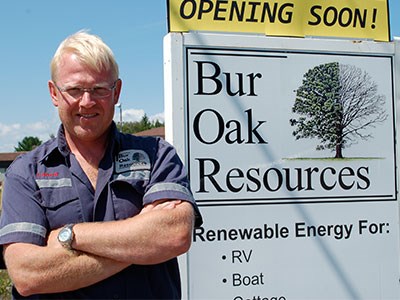When Lance Johnson entered the renewable energy industry, he didn’t take the easy route of buying a franchise. Instead, the owner of Bur Oak Resources in North Bay relies on a variety of suppliers.
“I use several suppliers to enable me to find the best solution for the customer and not what is the easiest for me. That is why I took the hard road.”
Johnson installs a variety of residential and industrial solar systems, micro-hydro systems and wind turbines.
He left a 20-year career in the mining industry and underwent a “green shift,” because of a new family and a desire “to do some good.”
He obtained certification from the North American Board of Certified Energy Practitioners, which is based in the United States.
“In Ontario right now, it is like the Wild West. Anyone can pick up and start selling solar systems and so that unfortunately, has led to some shoddy work being done which is bad for our industry. I take pride in what I do and I make sure everything is done properly.”
In business for three years, Johnson recently moved to a building on Pinewood Park Drive.
He has plans to make a storefront and the business will be re-branded as the Bur Oak Centre for Sustainable Living. He hopes to find like-minded businesses to lease space in the building.
“There will be a diverse range of things for living more efficiently,” Johnson said. “We plan to have an electric car charger here that will be solar powered. Car charging stations are far and few between in the North and this will be publicly accessible.”
There is no defined product list yet, since the building is undergoing major renovations, but it will include LED lights and solar powered chargers. Thermal electrical generators, knows as TEGs, will also be available, which are woodstoves that generate enough electricity to charge a laptop or phone.
“There will be a good rounded selection of useful products for those who want to leave a smaller footprint,” said Johnson, who's been in business for three years and has customers as far south as Burlington.
“When we build a system, it has to be built to last, and to make it efficient and perform well. The electrical code is there for safety but it is a minimum standard so we often find the code is not acceptable and it's too low of a standard,” Johnson said.
“With an off-grid type of system for a home, you depend on it so it is not something to be taken lightly.”
Johnson doesn’t see green energy as the culprit in higher electricity bills, but rather as the solution for the province’s energy woes.
When comparing the energy costs of the province to Quebec and Manitoba, Johnson said, Ontario has the highest because the other two do not have nuclear reactors.
Generating your own power, without taking advantage of any of the government programs, is one way to save money. Net metering is tied to the grid, which stores the energy you produce, he said. “During the day, you are over producing what you are using. The surplus goes into the grid, and the meter is turning backwards, counting credits into your account.
At night and during the winter, you are using those credits. You have 12 months to use them and the grid acts like a storage battery,” he said.
Solar and wind systems can be used for net metering.
“We can actually do a net metering installation up to 500 kilowatts,” said Johnson.
“Net metering is the most financially grounded step to living energy dependent. Off-grid gives you all kinds of flexibility to kick the meter to the curb. It all depends on just what you want to do.”




